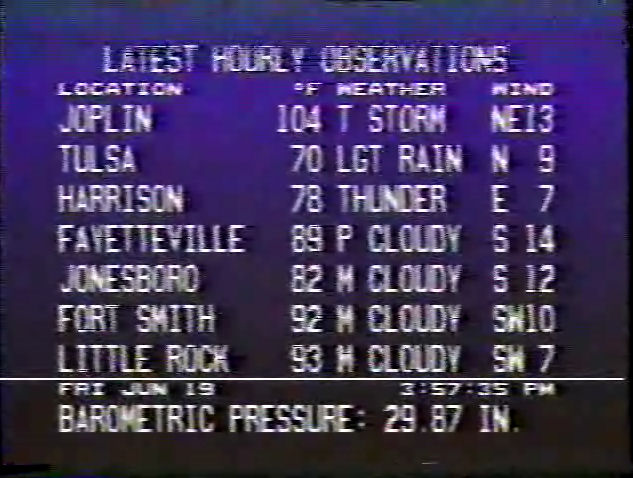Here begins a little tract that has been lying dormant in the back of my mind for a long time, and lately has been screaming to get out. I think this could be an important thing for you to read if you’ve ever considered getting into the media or into any creative endeavor as a profession. It’ll take me a while to reach my point, because I am largely making this up as I go along. And it’s probably not anything new – I’m sure everything I say here has probably been said by someone else already. But hey, I’m not charging you to look at it, so what the hell?
I’ve been there, you see. I have been writing and producing commercials for television and radio now, and have been exposed to both the good and the bad in this business. This doesn’t make me a hard-bitten, stoic veteran of showbiz by any stretch of the imagination. It just means I’ve stuck with the job through all the crap because…I like the end result. I like watching something I’ve done and getting a laugh out of it because, maybe about half the time, this means someone else will get a laugh out of it too. I like occasionally telling a total stranger about some spot I produced just to see if they’ll say they liked it, they hated it, or they don’t even watch that station. (I’ve heard all three in roughly equal measure!) All three are important to hear.
I got into broadcasting in 1989, influenced – as many newcomers to the business at that time were – by Good Morning, Vietnam, and Robin Williams’ mind-blowing disc jockey routine. And like many radio newbies at this time also found out, we’re not Robin Williams. Nobody is (well, with the possible exception of Robin Williams, perhaps). But after fooling around in the production room, I did figure out that anyone can make themselves sound good on tape, so after a couple of years spent reading the weather on an oldies radio station, I moved to a marginally hipper station with the primary goal of getting into commercial production.
Not wanting to brag too much, but I was good at it. I still like the stuff I came up with, from the stuff that was really, really, should’ve-been-submitted- for-an-Addy good, all the way down to the crap that was so lamentably stupid that it was funny in a pathetic sort of way. I’m not terribly fond of my “radio voice,” and even my character voices are shaky at times, but I was happy with the very odd concepts that I conjured up. Some of them were truly bizarre. In one case, I had to do a spot for a company that did commercial land surveying. I was given the following brief: give the name of the company, their address, and their phone number…and mention the Alma Spinach Festival. (Alma, Arkansas is the self-proclaimed spinach capitol of the universe, and once a year they gather round the bonfire to consume mass quantities of the leafy stuff and sacrifice a chosen one to the demigod Popeye.)
I came up with thirty seconds of unabashedly pure crap, total nonsense of the lowest possible denominator, and something I sure as hell wouldn’t have signed off on if it had been my business that was being advertised. But they went for it for some strange reason. It featured two characters in outrageously stereotypical redneck accents fighting over their borders in typical Smith vs. Jones fashion, agreeing to call this surveying company to settle the matter and secure their newfound pact by going to the Alma Spinach Festival together.
As I said, crap.
On the other hand, a scarcity of information can do wonderful things. Another spot from the same period advertised a distributor of ceramic tile for bathrooms, kitchens, and anywhere else you might want to use ceramic tile. Same brief – minus, thankfully, any mention of the Alma Spinach Festival – giving me virtually no information.
The result? A very odd Twilight Zone spoof, complete with me doing my best Rod Serling impersonation, detailing the trials and tribulations of “Bob,” an ordinary man who was so overwhelmed with this store’s enormously low prices that he bought enough ceramic tile to redecorate his entire home, inadvertently tiling the fridge shut and sealing Mrs. Bob into a room with a fresh wall of ceramic tile (presumably, he lured her there with the promise of a cask of amontillado). It was a very bizarre spot, but something I was much more proud of – it was humorous for the content of its script, not the pathetic lows to which its producer sank in the process of making it.
Occasionally, the sales rep will write something for you, which is good if they have a flair for writing, and nothing short of maddening if their finest creative moment was that sixth grade book report on Charlotte’s Web. Remind me to tell you sometime about the radio spot in which the sales rep thought the best way to advertise a new seafood restaurant would be to have me introduce the various items on the menu as if they were guest performers in a variety show…
All of this wallowing in the still-soft, slow-drying concrete of Memory Lane is meant to illustrate a point – if you’re going to create anything for a living, there are going to be less than stellar moments in your future. This doesn’t mean you suck. It means that you’re playing by ear, so join the club. And the universe being the perverse place that it is, there will even be people who absolutely love those creations that you thought were dead on arrival.
And while we’re talking about the natural sense of irony that goes with being alive, let’s analyze one very common – if not universal – aspect of the creative mind, whether professional or otherwise.
Whether you paint, write music, write stories, sculpt, act, sing, carve out rubber stamps of cartoony animals, or program web sites, there is one basic and essential through-line that runs through all of these things.
No matter what you’re doing to express yourself, at the core of it, you’re really doing it for other people.
If you draw a comic strip and no one else ever sees it, you’re like that tree that falls in the uninhabited forest, or Schroedinger’s Cat. Without showing that talent – or, perhaps, lack thereof – to someone, it is a potential that does not exist as far as anyone else is concerned. When you create something, really going through the entire effort of the concept and execution, it’s really there to be experienced by others, not necessarily by you. After all, you know what it’s supposed to be. You know what you were thinking when the thought first occurred to you. You cannot even gauge your own success without some kind of judgment on your work from an outside party.
Ever heard the term “performance art?” It’s an unnecessary redundancy, like George Carlin’s joke about hearing a weatherman warn of a “rain event,” or the thought of “pre-heating” the oven (heating it before you heat it? What?!). Any creative endeavor is going to be a spectator sport. Even if your performance only took place when you wrote, sculpted or sketched your work, the end result of that performance is what will be judged.
So, the universe having its cruel sense of irony, what is the worst thing that can happen here?
Creative people have a common cardiovascular anomaly. They wear their hearts on their sleeves. They are easily upset if their intention isn’t made clear by their work. Criticism is taken as a damnation of their very talent, and hence their very existence. And accusations of being derivative are even worse.
In time, you can learn to grow a somewhat thicker skin and take the criticism for what it is (and learn to discern between honest criticism and the naysayers who won’t let anyone get anything done).
And I’m going to talk about all of these things in much more detail.
Next time.
Skip to content
Being the blog of theLogBook.com's webmaster, Earl Green
You May Also Like:
Categories
Changes in fortune
Categories
The Little Green Men on closeness
Categories
The Little Green Men on hippo feasts
Categories
Conversations with Little C, day 990
Categories
How’s the weather 30 years ago?
Categories


+ There are no comments
Add yours